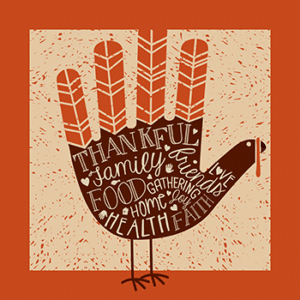By Mandy Weiss
Each year since as far back as I can remember, my parents always began Thanksgiving with the Shehecheyanu:
Baruch atah, Adonai Eloheinu, Melech haolam, shehecheyanu, v’kiy’manu, v’higyanu, laz’man hazeh.
Blessed are You, Adonai our God, Sovereign of all, who has kept us alive, sustained us, and brought us to this season.
This prayer helps us to mark this special occasion when all of us are able and fortunate enough to be together, and with so many of us spread out around the globe.
 This year, while we will not be able to physically come together to enjoy our turkey and stuffing sitting around a shared table, I know we will still begin our Zoom-facilitated Thanksgiving meal with this special prayer. As we did months ago at the beginning of this pandemic when we joined together around our virtual Passover Seder table, we are so very grateful that we are all healthy and still able to be together, even if miles apart.
This year, while we will not be able to physically come together to enjoy our turkey and stuffing sitting around a shared table, I know we will still begin our Zoom-facilitated Thanksgiving meal with this special prayer. As we did months ago at the beginning of this pandemic when we joined together around our virtual Passover Seder table, we are so very grateful that we are all healthy and still able to be together, even if miles apart.
Throughout this pandemic, and especially with this very different Thanksgiving approaching, I have frequently been reflecting on my experience participating in the Mussar for Moms program two years ago. This was a unique experience, organized by the Center for Jewish Engagement & Learning and facilitated by my wise and esteemed colleagues, Susan Goldberg Schwartz and Miriam Abramovich. While I gained quite a lot from learning about Hakarat Ha’tov, the practice of gratitude, it has certainly taken on new meaning for me now. In these difficult times, it is even more important to practice gratitude, as it is easy to be caught up in everything that has been taken away since mid-March and everything that we are now missing.
I learned that gratitude is about focusing on what is good in my life and being thankful for the things I have. Gratitude is pausing to notice and appreciate the things that I often take for granted—a home, food, clean water, friends, family, and even computer access that enables me to stay connected.
In the book Everyday Holiness by Alan Morinis, he writes that gratitude “means, literally, ‘recognizing the good.’ The good is already there. Practicing gratitude means being fully aware of the good that is already yours.” During these past eight months, I have struggled, some days more than others, but I make sure, no matter how deep I need to dig, that I find the good that I know is there.
When schools were closed but we had the technology for our children to take part in virtual learning and maintain contact with their teachers and friends, I had something to be grateful for.
When we experienced job loss and a feeling of great unknown about what our future would hold but still had each other to hold on to, I had something to be grateful for.
And today, if we are still unable to be with extended family but we have love and connection and the ability to virtually come together for Thanksgiving, I have a lot to be grateful for.
Morinis also writes, “even if we are aware of our gifts… we come to take the good for granted.” Looking back, I realize just how much I took for granted in my pre-COVID world—being able to go to the grocery store and workout in-person at the gym, having my children safely attend school in-person five days each week, and being able to visit extended family (grandparents, aunts/uncles, cousins) as often as we’d like (which was quite often!).
Two years ago, I committed to keeping my gratitude journal after my Mussar experience, and unfortunately, like many things, this fell to the back burner when everyday tasks assumed new weight in the context of the pandemic. Mundane and routine decisions became exhausting, and while I promised myself I would pause to think about all that I was grateful for at bedtime, I inevitably fell asleep before having the chance to do so. As we approach yet another holiday that we will have to celebrate physically distanced from family, I am humbly reminded of my need to return to my practice of Hakarat Ha’tov and appreciating the good in my life, even after this pandemic is long in the rearview mirror. I urge you to do the same; it is never too late to practice gratitude and discover how much good there is in your life.
Mandy Weiss is the Director of Planning and Overseas at the Buffalo Jewish Federation.

